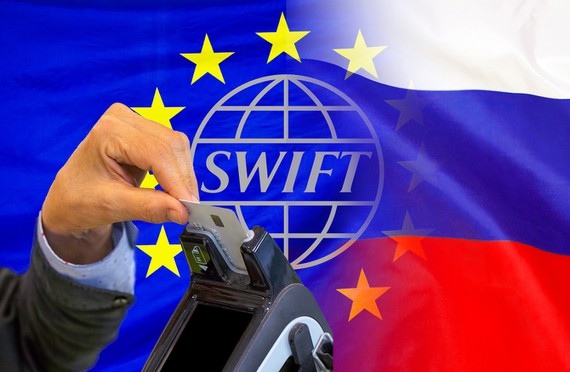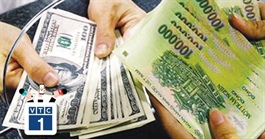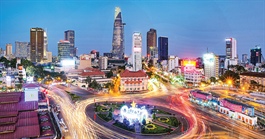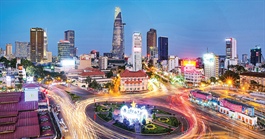Vietnam unaffected from Russia blockage of Swift
Vietnam unaffected from Russia blockage of Swift
On 27 February, the US, U.K., Canada, and the European Union announced the blockage of Russian banks from the Swift international payment system.
Illustrative photo. |
This is a global money transaction system connecting more than 11,000 financial institutions in more than 200 countries and territories across the world. It is now to be seen if such a blockage will in any way affect the Vietnamese economy.
Marginal affect
Like so many other countries, Vietnam too has economic and trade relations with Russia. The growth rate of import-export turnover between Vietnam and Russia in 2020 reached USD 5.3 bn, up from USD 4.42 bn in 2019. In this, Vietnam's exports to Russia reached USD 3.2 bn, and imports reached USD 2.1 bn. The import-export turnover between Vietnam and Russia in 2021 reached USD 7.14 bn, accounting for only 0.9% of Vietnam's total import and export turnover.
Tourism between Russia is also an important source of revenue. However, the number of international visitors from Russia only accounted for about 8% of the total arrivals in the first two months of 2022. Therefore, Russian tourists only play a small part in the recovery momentum for Vietnam's tourism industry.
By blocking the Swift international payment system for the Russian banking system, some Russian investment projects in Vietnam will certainly be affected. Some projects may not receive adequate and timely capital to implement as per the schedule.
Russia occupies 25th position out of 140 countries and territories having Foreign Direct Investment (FDI) capital in Vietnam with 150 projects, at a total investment cost of about USD 953.7 mn. Most of the Russian investment projects in Vietnam are in electricity and oil and gas, of which many projects have not yet been implemented or are new at the exploration or research stage. Therefore, the suspending of these projects hardly affects the scale of the oil and gas industry.
Access to Swift
The Russia-Ukraine conflict is one of the main reasons for the increase in prices of some raw materials for production and consumption such as gas, oil, wheat, aluminium, nickel, and corn, due to the huge production and export market share of Russia and Ukraine.
Therefore, if the tensions between Russia and Ukraine continue for a long time, it may cause many countries, including Vietnam, to face difficulty in supplying the above raw materials and fuel for the next few years. The possibility of importing inflation into Vietnam will also increase. Moreover, when the price of oil, gas, and raw materials increases, the recovery and growth of the world economy will also slow down. This may be an indirect factor that slows down Vietnam's economic growth and recovery as well.
Without access to the Swift international payment system, Russia may use traditional tools such as telephones, telegraphs, and emails to conduct inter-bank transactions. Although these tools are outdated, are slow in speed, are less secure, and much costlier, they will serve as an immediate solution for current disconnection from the Swift system.
Disconnecting Russia from the Swift international payment system could push Russia to participate more strongly with other technology platforms, such as China's Cross-Border International Payment System (CIPS), built in 2015. Moreover, Russia also has the SPFS Domestic Financial Alert Messaging System. The first transaction on the SPFS network was made in December 2017. Russia also seeks to expand the connectivity of SPFS to the global payment system.
Moreover, since 2019, on the eve of the BRICS Summit, Russia, India, and China have been conducting research on alternative solutions to the Swift international payment system. If needed, Russia's SPFS system can be connected to China's CIPS cross-border inter-bank payment system. Although India does not yet have a financial transaction system in the country, there are plans to link to the platform of the Central Bank of Russia with a number of services that are currently under development.
However, the influence of SPFS is still considered to be quite modest. By the end of 2020, this system had only participants from 400 financial institutions from 23 countries.
Under the present circumstances, enterprises participating in import-export activities with Russia need to apply for risk prevention measures in payments and appropriate payment methods when entering into contract with customers. Secure international payment methods such as Irrevocable Letters of Credit (ILC) should be considered as an alternative to other less secure alternatives.
At the same time, Vietnamese businesses and banks also need to carefully consider their reputation, as well as the solvency of payment banks before entering into any contracts. For small value orders, businesses can pay through the KFT payment channel built by the Bank of Foreign Trade of Russia (VTB). Up until now, after five years of implementation, the KFT system has operated stably, safely, and smoothly, and is capable of serving well for bilateral payment activities between the two countries.
At the same time, Vietnamese enterprises doing business with Russia and Ukraine need to actively keep in contact with the Trade Department of Vietnamese embassies in these two countries to find solutions, in case they encounter difficulties during transactions. In addition, businesses also need to expand to more markets in countries in the Eurasian region, and markets in other regions of the world, in order to promote import-export activities and growth of enterprises.


























